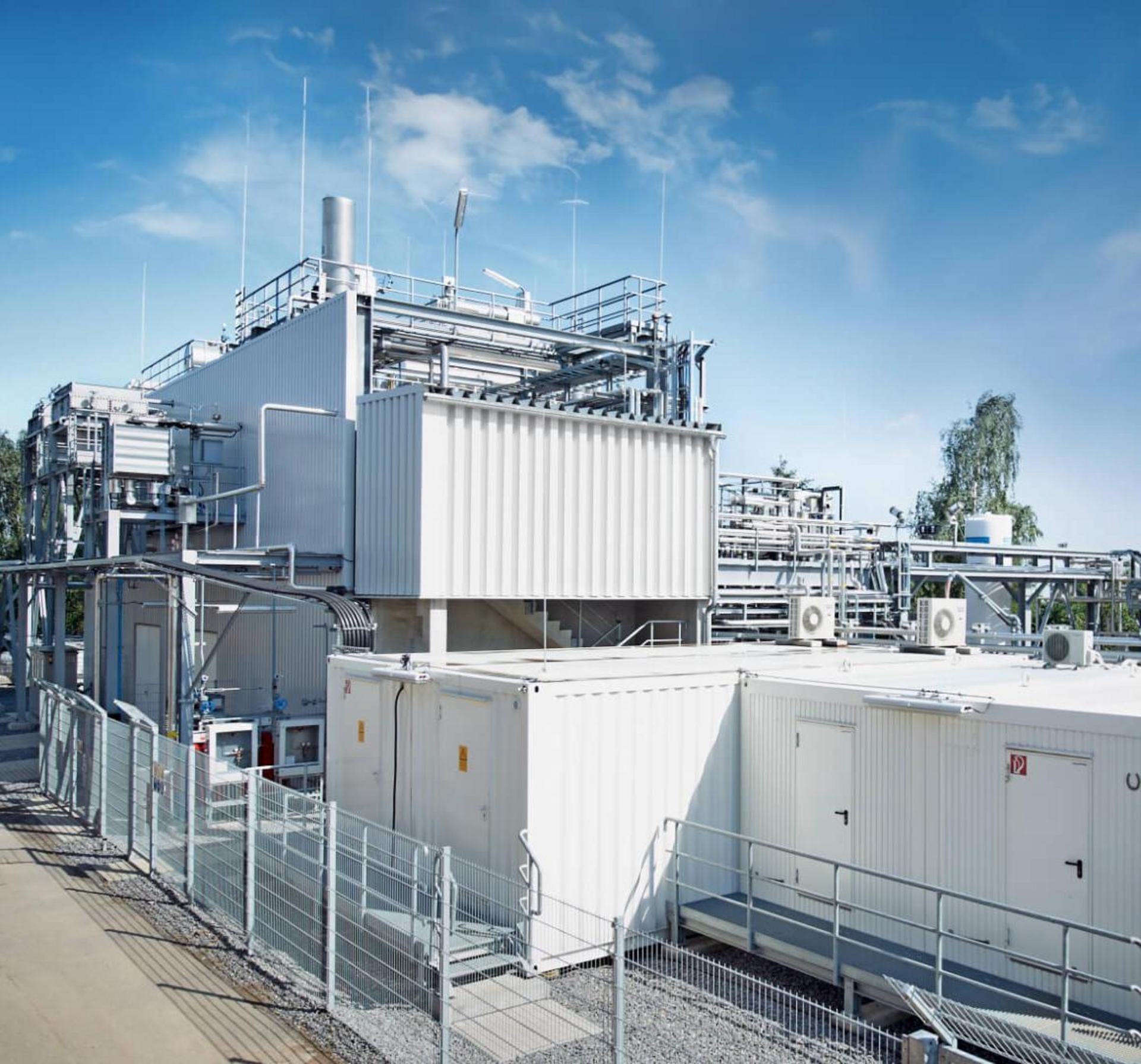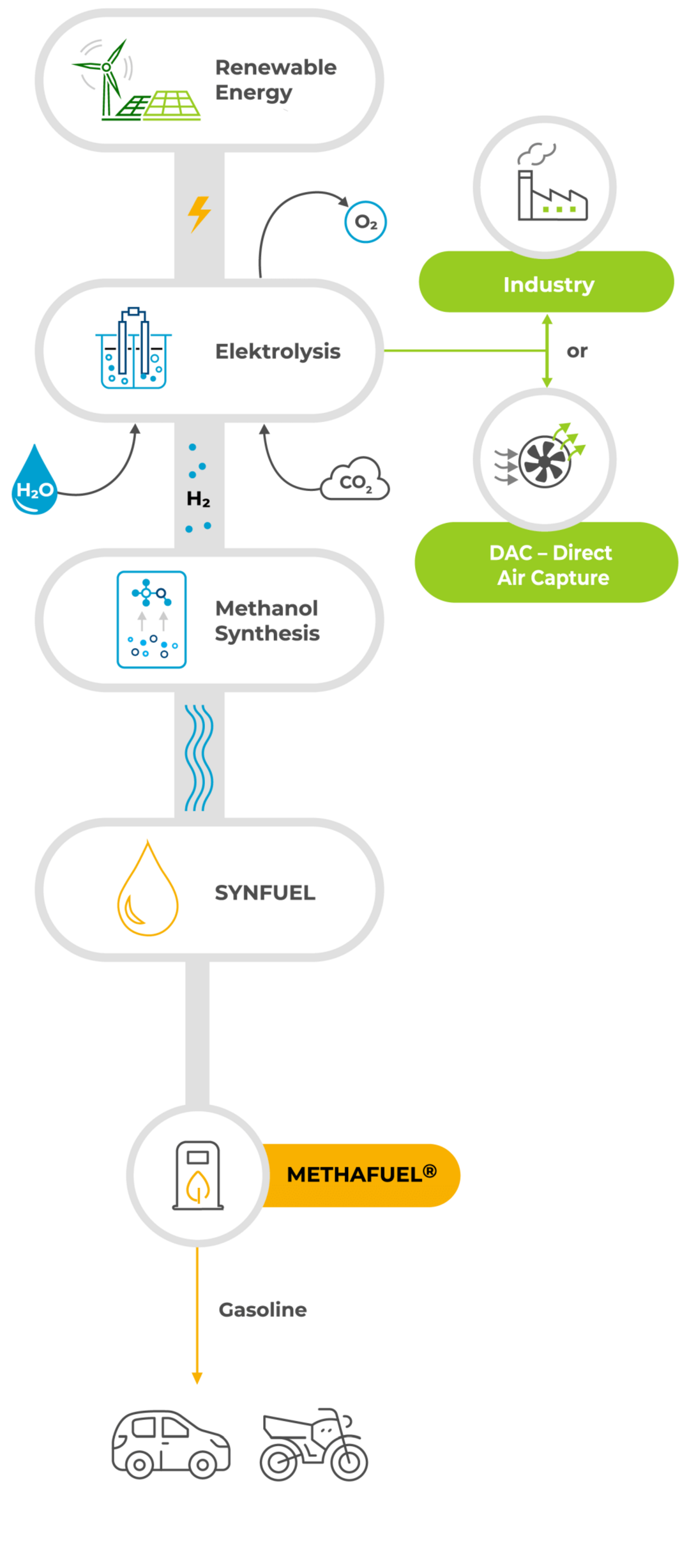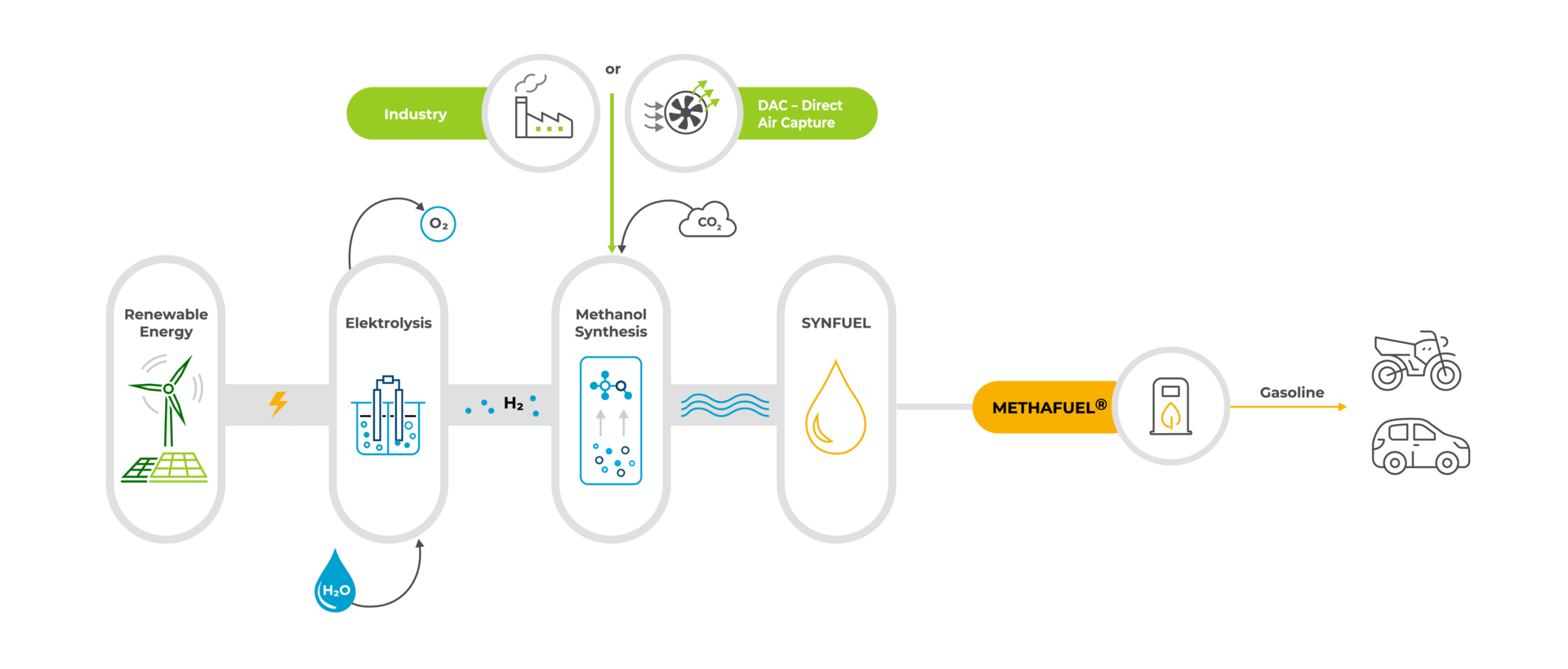CAC METHAFUEL® – synthetic gasoline
In this day and age, the production of synthetic fuel, also called e-fuels, is technically mature and easy to implement. In order to make a significant contribution to achieving the goals of climate protection, renewable energy from solar, wind or hydro power must be applied for the production of e-fuels. It is especially efficient to relocate the electricity generation to sunny and windy regions. The green electricity gained there is used to produce hydrogen by water electrolysis. Subsequently, it will be converted with carbon dioxide (CO2), for instance, to methanol, a transportable, liquid energy carrier which can be refined to e-gasoline by means of the CAC METHAFUEL® technology at any place in the world.
Therefore, we can make a crucial contribution to the achievement of climate protection goals with synthetic gasoline through energy partnerships and international cooperations. Thanks to our market-ready gasoline technology, we belong to the three leading technology providers in this field worldwide.

Europe’s largest demonstration plant for synthetic gasoline
Practical test confirms quality: The most important process stage in the manufacturing chain is the conversion of the methanol extracted from carbon dioxide and hydrogen into gasoline. In the demonstration plant at the Freiberg University of Mining and Technology we have already produced more than 200,000 liters of the green gasoline.
It was filled into tanks and sent to car manufacturers and has already confirmed it’s suitability for practical use in fleet trials and motor sport applications.
„… both the gasoline quality and the technical plant design allow the implementation on a large industrial scale. The first production plant for 70 million liters of synthetic gasoline is currently in the course of preparation. Thus, we make a vital contribution to achieving the sustainability goals of the EU as well as the Federal Government of Germany.

The technology is ready for the market
The produced synthetic methafuel meets the European fuel standard DIN EN 228 and can be used without modifications in standard gasoline engines. It can also be distributed quickly and in large quantities via the existing filling station network.
The fuel we produce has been successfully tested by the car industry and can either be used as pure fuel or as drop-in fuel.
Since 2012, our fuels have been successfully used in motor sport races. Synthetic gasoline has been used for the third time in a row at the ADAC 24-hour race at the Nürburgring. Our greatest achievement in sports is the victory of motorcycle racer Toprak Razgatlıoğlu from the ROKiT BMW Motorrad World SBK Team. In 2024 at the FIM Superbike World Championship (World SBK), he won the title of the world champion with a synthetic gasoline produced on the basis of our CAC METHAFUEL® technology.
No, CAC’s synthetic gasoline is drop-in compatible and can be used without any concerns in current vehicle engines. This was verified in fleet trials by various car manufacturers.
If renewable energies, such as solar or wind power, are used for production, e-fuels can be produced carbon neutral.
In the best-case scenario, production of e-fuels takes place in facilities that are located in areas with a surplus of renewable energy. For example, in regions with high wind or sun resources.
At the moment, there is still a lack in the political will to produce e-fuels on a large scale. To do this, investments in plants and machinery are required in order to make sure that sufficient capacity is available to scale up e-fuel production. As soon as the potential of synthetic fuels towards climate protection is recognized, production can start quickly.
The technology is market-ready and available. As soon as the political will is present, production of e-fuels can start on a large scale and the fuels can be made available.
The short answer is YES. Renewable energy is available in abundance all over the world, it is just unequally distributed. If plants for the production of e-fuels are built in energy-rich regions, global CO2 emissions can be reduced and climate protection targets achieved. E-fuels offer the easiest way to store renewable energy in the form of synthetic fuels.
E-fuels can play an important role in climate protection. The technology is ready for the market already today and can be used with the current infrastructure. No modifications at filling stations or car engines are required. E-fuels therefore fit in perfectly with our current lifestyle and at the same time reduce our CO2 footprint.
Using the electricity directly is of course more efficient than using e-fuels. However, as e-fuels are mainly produced in regions where renewable energies are available in abundance, this question is not relevant. It is much more a question of how efficiently electricity can be generated from renewable and CO2-neutral sources in order to be able to produce synthetic fuels in a CO2-neutral way.
As soon as the large-scale production of synthetic fuels has started, the price of e-fuels will become cheaper. These economies of scale will result in e-fuels at prices not much higher than that of fossil fuels. Of course, there are also opportunities for legislators to exert influence through changes to current taxes and duties.
A glance into the future
The manufacture of gasoline using the power-to-liquid concept sets an important milestone for the climate-friendly mobility of the future. E-fuels allow for efficient storage and worldwide distribution of renewable energies in the form of liquid fuels.
Hydrogen and its derivatives are increasingly moving into the focus of political and public debate. The Federal Government of Germany plays an active role in supporting the development of climate-friendly technologies through its National Hydrogen Strategy.
This is an opportunity for us to use our expertise and innovative strength and take a leading role in energy transition. The aim is to gradually expand the production of synthetic gasoline and successively replace fossil fuels.



